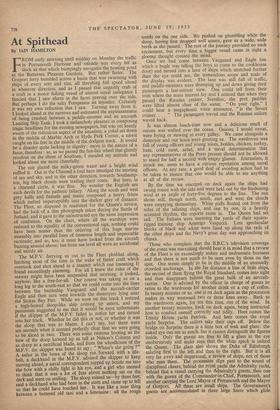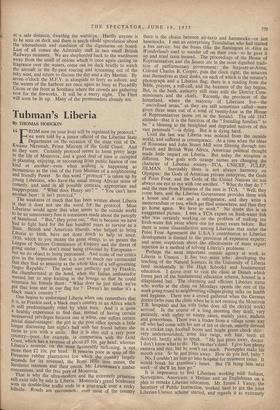At Spithead
By LAIN HAMILTON FROM early morning until midday on Monday the traffic in Portsmouth Harbour and outside was every bit as thick as that which bumpingly navigates the boating pond at the Battersea Pleasure Gardens. But rather faster. The Gosport ferry bumbled across a basin that was swarming with ships of every sort and size, all threshing full speed ahead in whatever direction, and as I passed this ungainly crab of a craft in a motor fishing vessel of almost equal inelegance I fancied that I saw alarm in the faces peering over the side. But perhaps I do the salty Pompeians an injustice. Certainly it was my own reflection that I saw. Turning away from it, I looked ahead at the narrows and estimated the unpleasantness of being crushed between a paddle-steamer and an uncouth Landing Ship Tank. I took a melancholy pleasure in composing tragic headlines for the evening newspapers, but was yet keenly aware of the ridiculous aspect of the situation; a yokel set down in the middle of Marble Arch or Hyde Park Corner, a nitwit caught on his feet in the middle of the dodgem track. It would be a disaster quite lacking in dignity : more in the nature of a farce, therefore : so, as we passed the fun-fair wheel that glumly revolves on the shore of Southsea, I mended my attitude and looked about me more cheerfully.
The sun glazed the milky-green water and a bright wind ruffled it. Out in the Channel a foul haze smudged the meeting of sea and sky, and in the other direction, towards Southamp- ton, big black clouds were trailing their coats. But here, in a charmed circle, it was fine. No wonder the English are such devils for the pathetic fallacy. Along the south and west grey hulls and funnels and masts composed a heavy frieze which melted imperceptibly into the darker grey of distance. The Fleet, so disposed in readiness for the Queen's review, had the look of a dim photograph taken during the Battle of Jutland, and it gave to the uninstructed eye the same impression of confusion. On the chart, where all the warships were reduced to the equality of the conventional sign, nothing could have been neater than the ordering of this huge marine assembly into parallel lines of immense length and impeccable rectitude; and so, too, it must have looked from the aircraft buzzing around above; but from sea level all wore an accidental and untidy air.
The M.F.V. ferrying us out to the Fleet plodded along, lurching most of the time in the wake of faster craft which overtook and shot ahead in a manner which one (meaning I) found exceedingly alarming. For all I knew the rules of the seaway might have been suspended that morning; it looked, anyhow, like a free-for-all. Our course was taking us on a long leg to the south-east so that we could come into the lines between the battleship Vanguard and the aircraft-carrier Eagle and then turn west towards the destroyers lying near the Stokes Bay Pier. While we were on this track I noticed a high-bowed sloop-like ship coming up astern, and my pessimism suggested to me that it would be most unfortunate if the skipper of the M.F.V. failed to notice her and turned into her track. Whether he did this or not, or whether it was the sloop that was to blame, I can't say, but there were ten seconds when it seemed perfectly clear that we were going to be sliced in two. There was some raucous hooting as the bow of the sloop loomed up as tall as Nelson's Column and as sharp as a sacrificial blade, and from the wheelhouse of the M.F.V. the skipper was heard to say : " Where's she going ?" A sailor in the bows of the sloop ran forward with a life- belt, a deckhand in the M.F.V. advised the skipper to keep moving ahead, a naval correspondent nipped up beside me into the bow with a chilly light in his eye, and a girl who seemed to think that it was a lot of fuss about nothing sat on the deck and went on smiling. The sloop missed us—by three feet, said a deckhand who had been in the stern and came up to tell us that he could have touched her. It was like a near thing between a battered old taxi and a limousine : all the rough words on the one side. We pushed on grumbling while the sloop, having first dropped well astern, gave us a wide, wide berth as she passed. The rest of the journey provided no such excitement, but every time a bigger vessel came in sight a gloomy thought crossed the mind.
Once we had come between Vanguard and Eagle (on which a bugle was telling the boys to come to the cookhouse door) and turned. into a lane of ships which stretched further than the eye could see, the tremendous scope and scale of the flisplay was evident. The lane was still full of traffic, and paddle-steamers were thumping up and down giving their passengers a last-minute view. One could tell from their trim where the main interest lay and I noticed that when they passed the Russian cruiser, Sverdlov, the port paddles were lifted almost clear of the water. " On your right," I could hear a megaphonic voice announce, " is the Soviet cruiser. . . . " The passengers waved and the Russian sailors waved back.
It was almost lunch-time now and a delicious smell of onions was wafted over the ocean. Onions, I would swear, were frying or stewing in every galley. We came alongside a destroyer and our hosts were greeting us. The wardroom was full of young officers and young wives, bottles, chicken, turkey,. ham, cold meat, salad, and a naval determination that any representatives of the Press present should not be allowed to stand for half a second with empty glasses. Journalists, it struck me, seem to have a curious reputation among naval officers. At any rate, a good deal of avoiding action had to be taken to ensure that one would be able to see anything at all of the review.
By the time we emerged on deck again the ships had swung round with the tide and were held out by the freshening wind at an angle of forty-five degrees to the line. The sun shone still, though north, south, east and west the clouds were emptying themselves. White puffs floated out from the sides of the saluting ships, and one by one, in a heavily accented rhythm, the reports came in. The Queen had set sail. The Italians were manning the yards of their square- rigged training ship Amerigo Vespucci. Less spectacular blocks of black and white were lined up along the rails of the other ships and the Navy's great day, was approaching its climax.
Those who complain that the B.B.C.'s television coverage of the event was unexciting should bear it in mind that a review of the Fleet is an exceedingly sedate and undramatic business and that there is not much to be .seen even by those on the spot. One seems simply to be in the middle of an unusually crowded anchorage. In the far distance a line of little ships, the second of them flying the Royal Standard, comes into sight and then disappears behind the great bulk of an aircraft- carrier. One is advised by the officer in charge of guests to retire to the wardroom for another drink or a cup of coffee. In twenty minutes or so one is on deck again,as the procession makes its way westward two or three lines away. Back to the wardroom again, for tea this time, out of the wind. In another twenty minutes, back on deck again, being instructed how to conduct oneself correctly and tidily. Here comes the Trinity House yacht Patricia. And here comes the royal yacht Surprise. The sailors take their caps off. Below the bridge on Surprise there is a little box of teak and glass : the naked eye can see as much, but it cannot distinguish the figures inside. Only the guests are free to lift a glass to the eye unobtrusively and make sure that the white speck is indeed the Queen. The glass also shows the Duke of Edinburgh saluting first to the left and then to the right. But it is all very far away and impersonal, a review of ships, not of those who man them. The procession slips past to the sound of disciplined cheers, behind the royal yacht the Admiralty yacht, behind that a vessel carrying the Admiralty's guests, then one with the guests of the Commander-in-Chief, Portsmouth, and another carrying the Lord Mayor of Portsmouth and the Mayor of Gosport. All these are small ships. The Government's guests are accommodated in three large liners which glide at a safe distance, dwarfing the warships. Hardly anyone is to be seen on deck and there is much ribald speculation about the whereabouts and condition of the dignitaries on board. Last of all comes the Admiralty staff in two small British Railways steamers. We are shepherded back to the wardroom away from the smell of onions which is once again casting its fragrance over the waters, come out on deck briefly to watch the aircraft in the fly-past roaring and screaming out of the inky west, and return to discuss the day and a dry Martini. By seven o'clock the M.F.V. is alongside to ferry us ashore, and the waters of the harbour are once again as busy as Piccadilly Circus or the front at Southsea where the crowds are gathering now for the fireworks. It will be a merry night. The Fleet will soon be lit up. Many of the promenaders already are.



















































 Previous page
Previous page